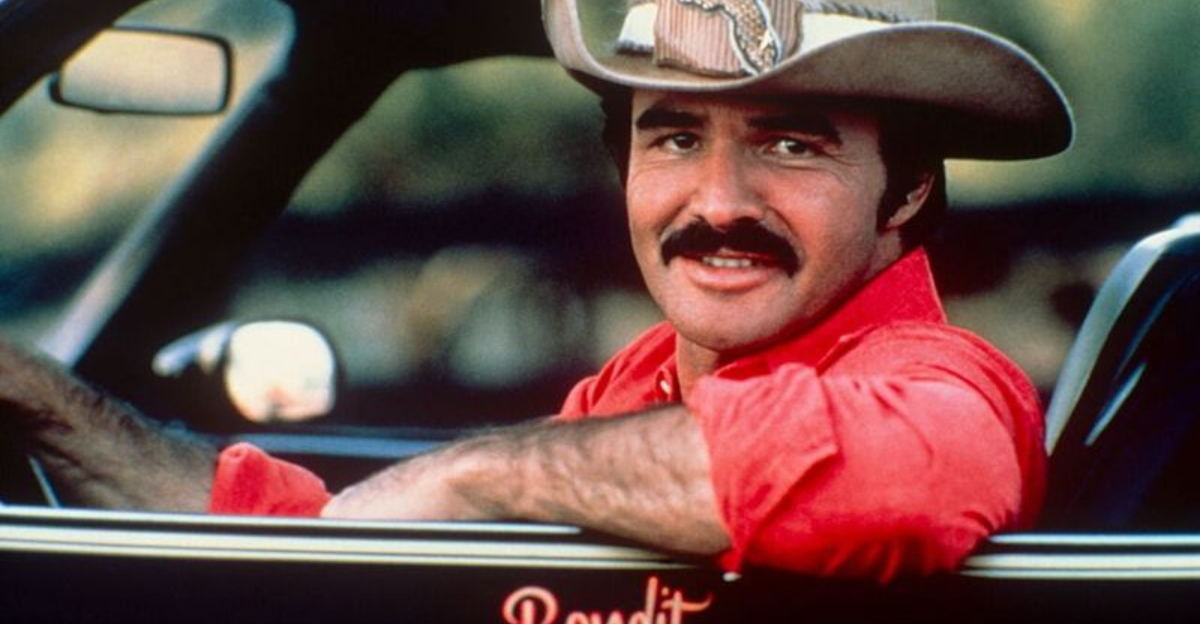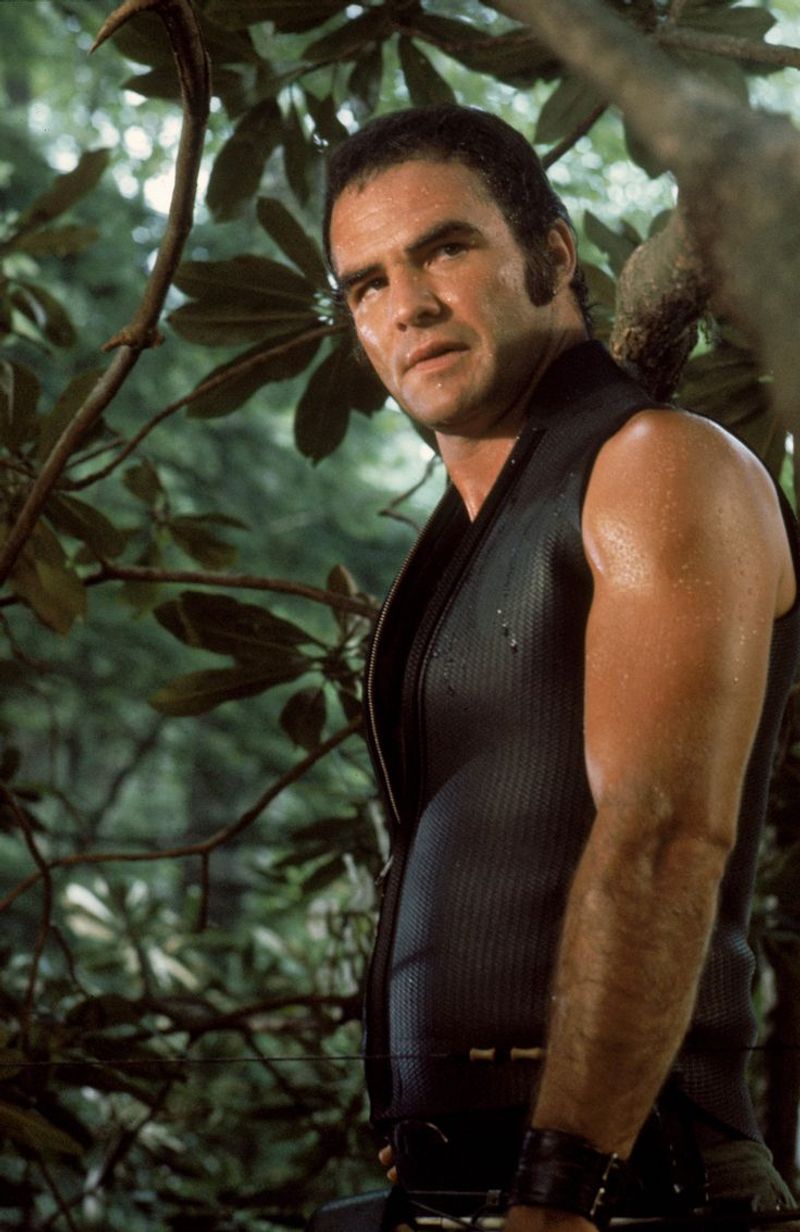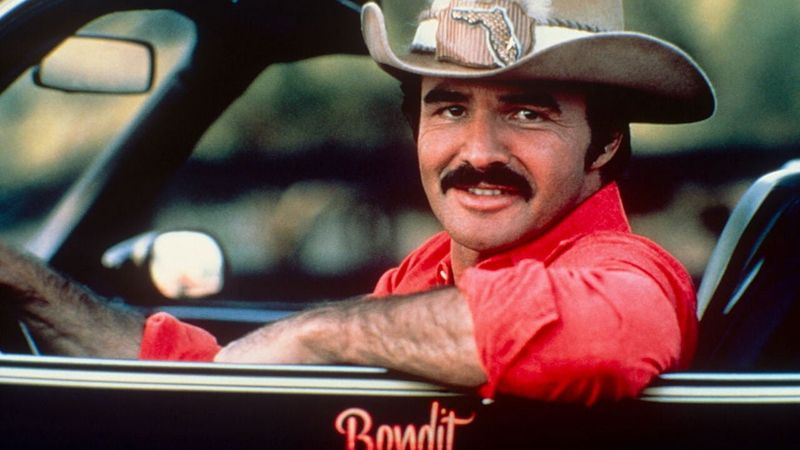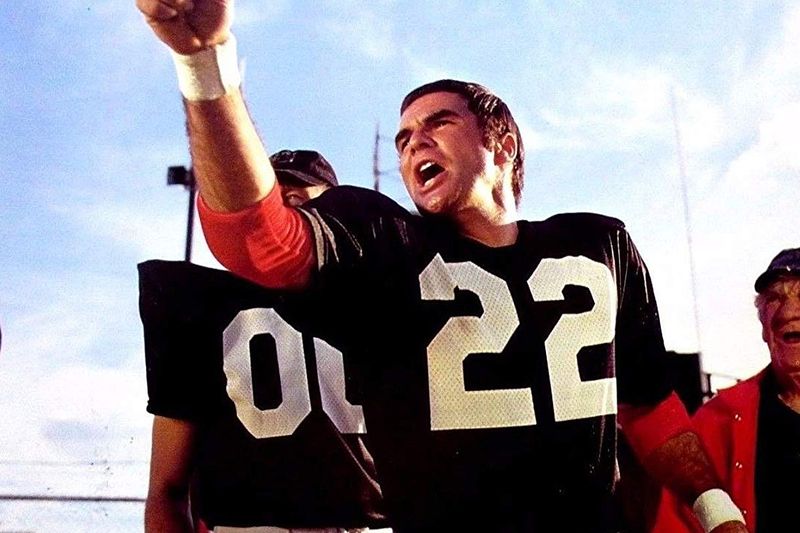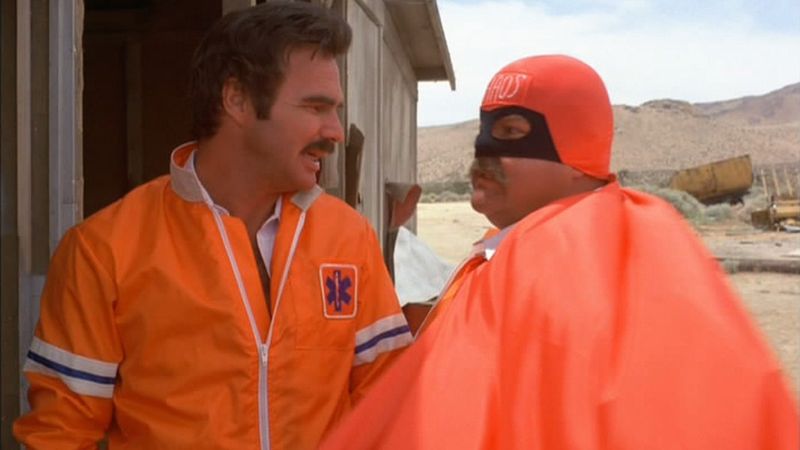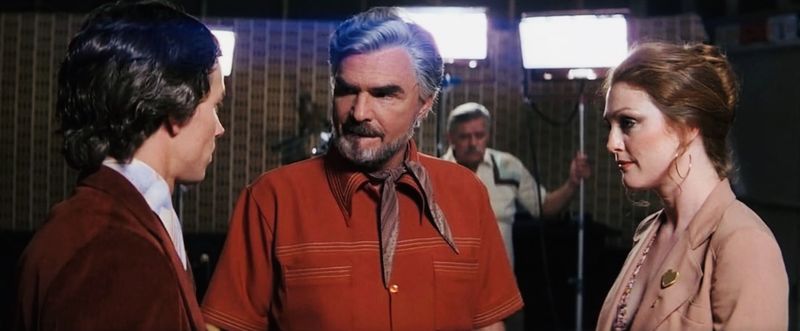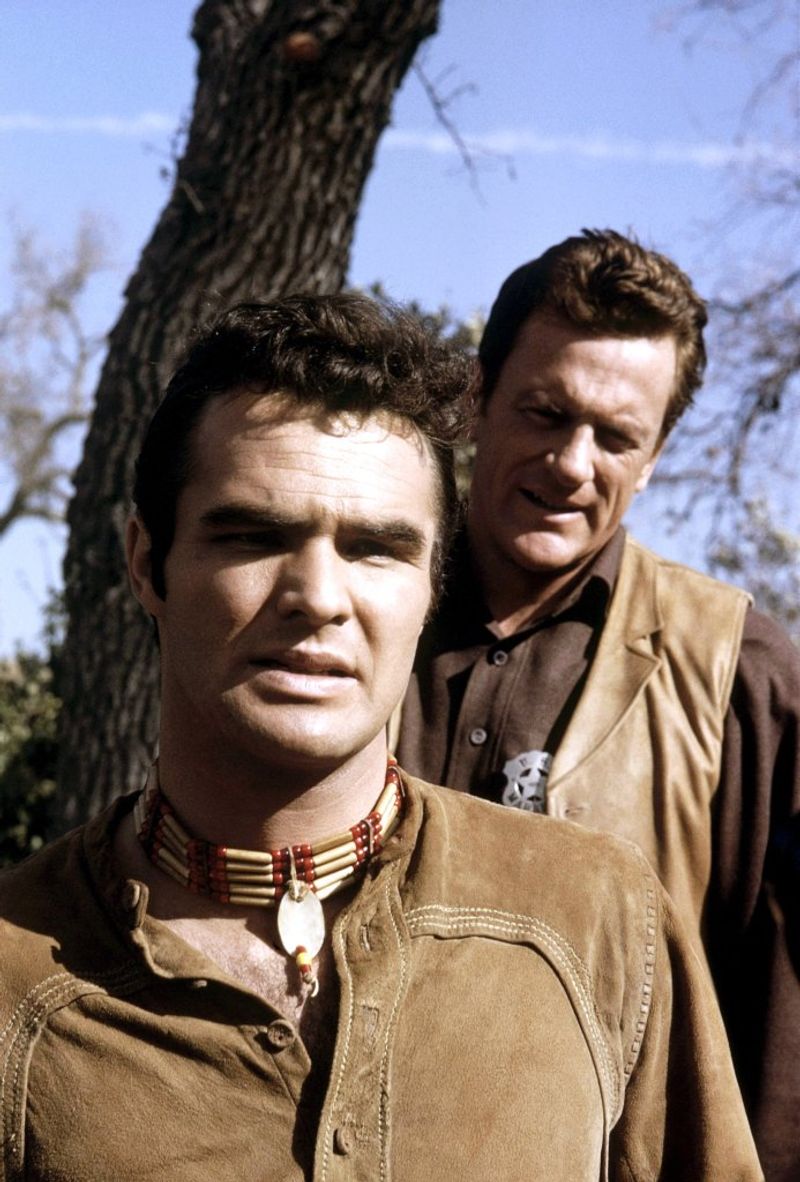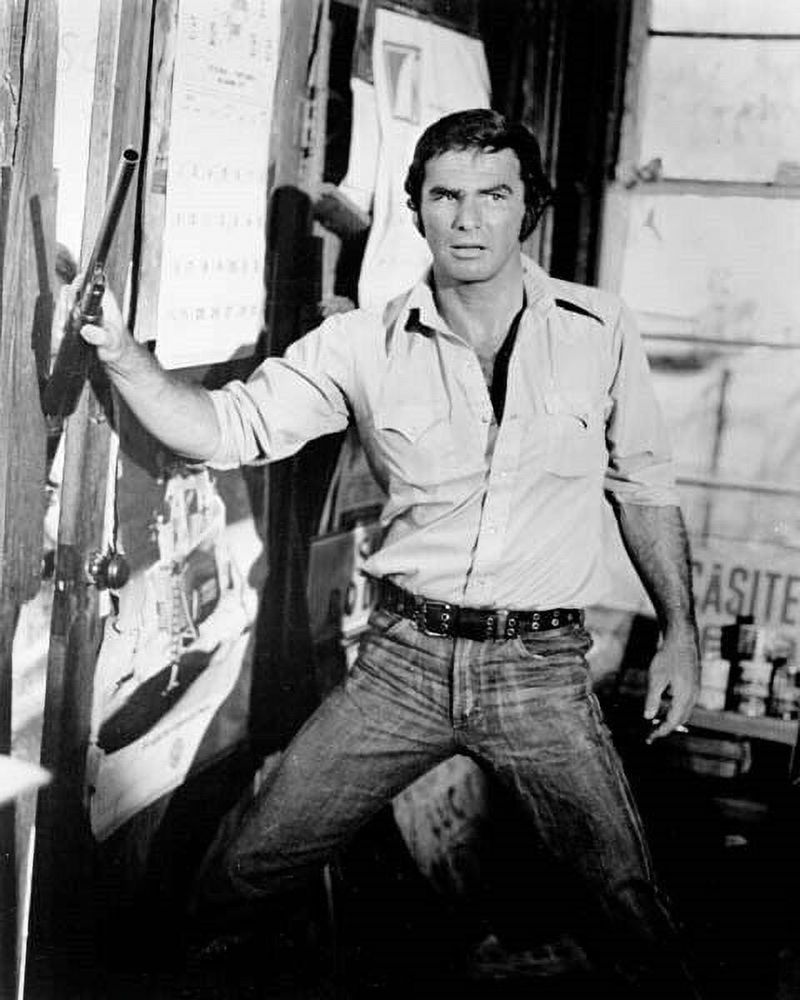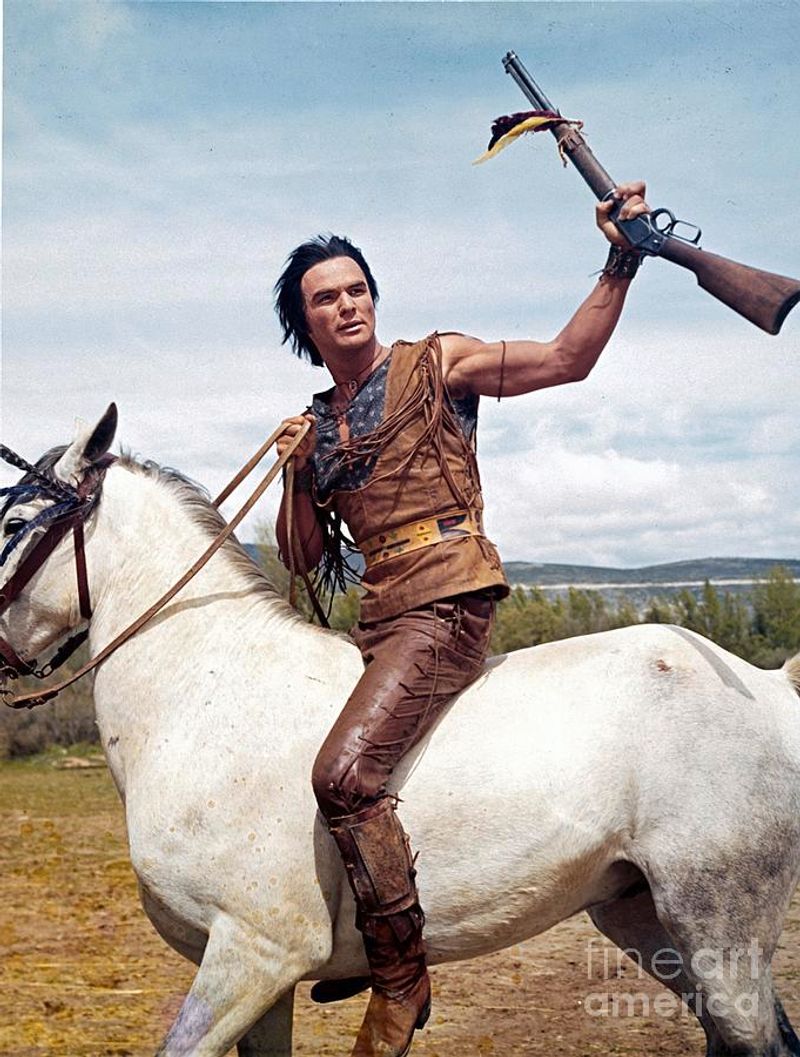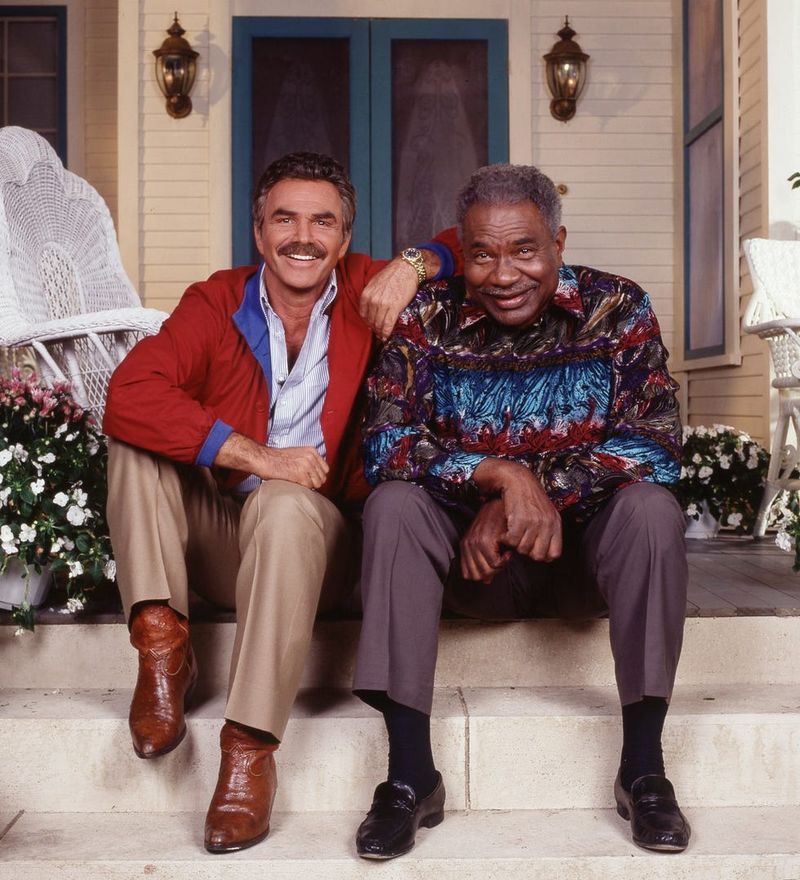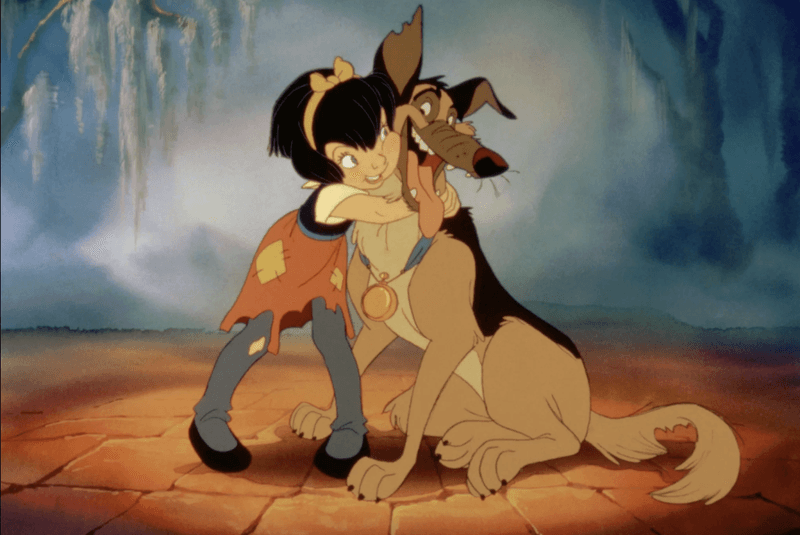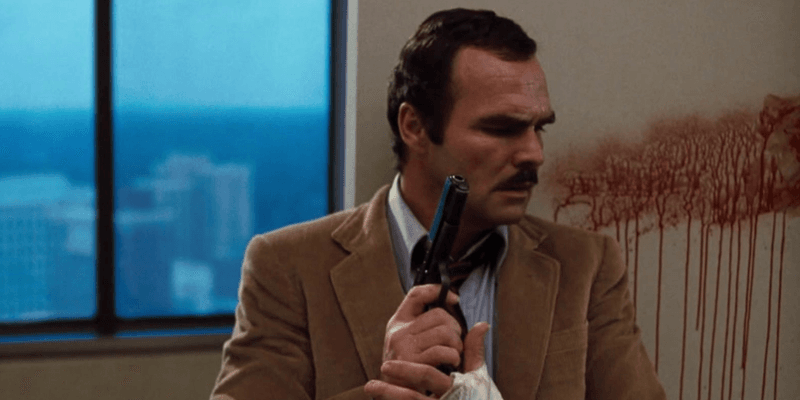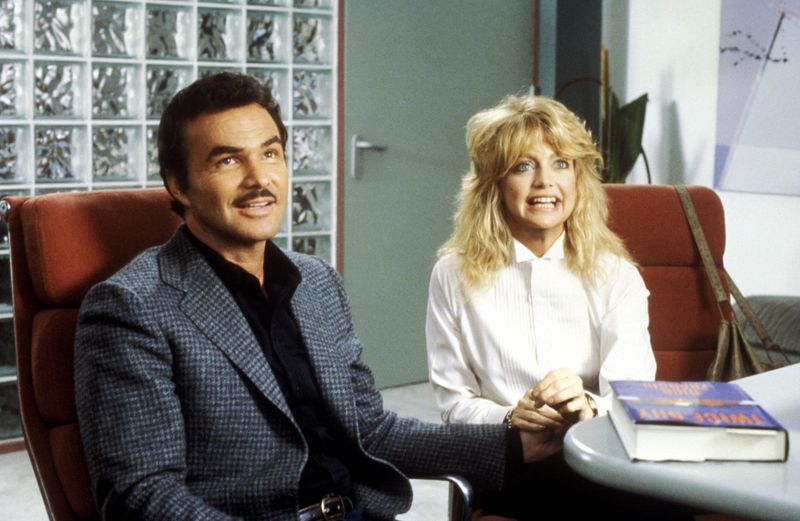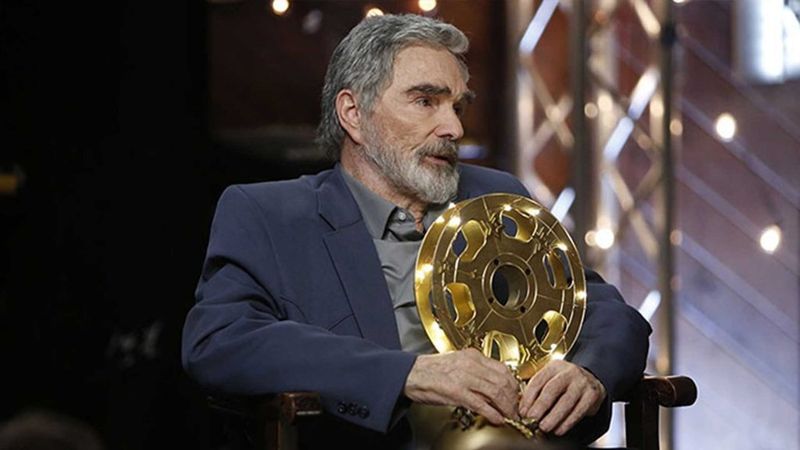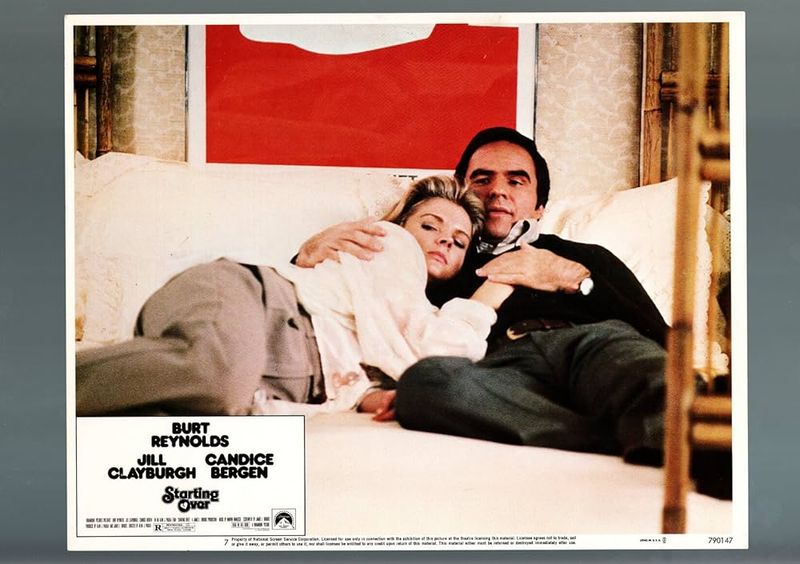Burt Reynolds captivated audiences for decades with his charismatic smile, trademark mustache, and undeniable screen presence. From high-octane car chases to thoughtful dramas, his versatile acting career spanned over 60 years in Hollywood. These roles not only showcased his remarkable range as an actor but also cemented his status as one of America’s most beloved film stars.
1. Lewis Medlock in Deliverance (1972)
The role that transformed Reynolds from TV actor to serious film star. As the bow-hunting, adventure-seeking Lewis, Reynolds delivered a performance of raw intensity and unexpected vulnerability in this harrowing backwoods thriller. Director John Boorman’s adaptation of James Dickey’s novel pushed Reynolds to new dramatic heights. His portrayal of the outdoorsman whose masculine bravado crumbles when faced with true wilderness danger revealed depths previously untapped in his career. The film’s success and critical acclaim established Reynolds as more than just a handsome face, proving he could handle complex, challenging material alongside accomplished actors like Jon Voight and Ned Beatty.
2. The Legendary Bandit in Smokey and the Bandit (1977)
Reynolds rocketed to superstardom as Bo “Bandit” Darville, the smooth-talking trucker who makes a bet to transport bootleg beer across state lines. His chemistry with Sally Field and cat-and-mouse games with Jackie Gleason’s Sheriff Buford T. Justice created comedy gold. Behind the wheel of that iconic black Trans Am, Reynolds embodied American rebellion and charm. The film became a cultural phenomenon, spawning sequels and cementing Reynolds’ status as Hollywood’s highest-paid actor of the late 1970s. Few roles merged so perfectly with an actor’s real-life persona. Reynolds’ natural charisma, mischievous grin, and Southern swagger made Bandit an instant classic that fans still celebrate today.
3. Paul Crewe Takes the Field in The Longest Yard (1974)
As disgraced quarterback Paul Crewe, Reynolds showcased both his athletic prowess and dramatic range. The former college football player looked completely natural dodging tackles while organizing a team of prison inmates against brutal guards. Reynolds brought genuine emotional weight to this sports classic. Beneath Crewe’s cocky exterior lay a man seeking redemption, creating a character audiences couldn’t help rooting for despite his flaws. The film’s perfect blend of hard-hitting action, prison drama, and underdog spirit made it a box office hit. Reynolds later appeared in the 2005 remake alongside Adam Sandler, passing the torch to a new generation while reminding viewers of his original, definitive performance.
4. Racing for Glory as J.J. McClure in The Cannonball Run (1981)
Reynolds had an absolute blast as ambulance driver J.J. McClure in this star-studded comedy about an illegal cross-country race. Surrounded by friends like Dom DeLuise, Sammy Davis Jr., and Dean Martin, his genuine enjoyment radiates through every scene. The film capitalized on Reynolds’ car-chase credentials established in Smokey and the Bandit. His natural comedic timing and willingness to poke fun at his own macho image made audiences feel like part of an extended family road trip. While critics weren’t kind, viewers loved the film’s zany energy and celebrity cameos. Reynolds’ infectious laugh and playful chemistry with the cast turned what could have been a simple cash-grab into an enduring comedy favorite.
5. Oscar-Nominated Turn as Jack Horner in Boogie Nights (1997)
Reynolds initially resisted director Paul Thomas Anderson’s offer to play adult film director Jack Horner. Yet this complex role in the 1970s porn industry drama earned him his only Academy Award nomination and a career renaissance at age 61. As the paternalistic filmmaker who sees artistic merit in adult entertainment, Reynolds delivered a nuanced performance that balanced authority with vulnerability. His portrayal avoided caricature, instead finding the humanity in a man creating family among society’s outcasts. Though Reynolds reportedly clashed with Anderson during filming and later declined a role in the director’s follow-up film Magnolia, his performance stands as one of his most critically acclaimed, proving his dramatic capabilities had only deepened with age.
6. Television Breakthrough as Quint Asper on Gunsmoke (1962-1965)
Before Hollywood stardom, Reynolds honed his craft as half-Comanche blacksmith Quint Asper on the legendary Western series. His rugged good looks and natural screen presence made him an instant fan favorite among the show’s loyal viewers. The role provided Reynolds valuable experience alongside television veterans like James Arness and Amanda Blake. As one of television’s first mixed-heritage characters portrayed with dignity, Quint allowed Reynolds to explore dramatic storylines about prejudice and acceptance. Though he appeared in just 50 episodes over three seasons, this early role established Reynolds’ trademark blend of toughness and charm. His departure from the series to pursue film opportunities marked the beginning of his trajectory toward becoming one of America’s biggest movie stars.
7. Crime-Fighting Detective in Dan August (1970-1971)
Reynolds portrayed Lieutenant Dan August, a no-nonsense homicide detective solving crimes in his California hometown. Though the series lasted just one season, it showcased Reynolds’ growing screen confidence and leading man potential. The show’s serious tone and character-driven plots allowed him to develop his dramatic skills. August wasn’t just a tough cop – Reynolds infused him with intelligence and emotional depth that hinted at the film roles to come. Interestingly, the series found greater success in reruns after Reynolds became a movie star. His appearance on The Tonight Show promoting the syndicated episodes led to his famous rapport with Johnny Carson, helping cement his reputation as one of Hollywood’s most entertaining interview guests.
8. Southern Outlaw Gator McKlusky in White Lightning (1973)
Reynolds channeled his Southern roots as Gator McKlusky, an ex-con moonshine runner seeking revenge for his brother’s murder. The film’s spectacular car chases and backwoods setting established the formula that would make him the king of good ol’ boy action films. What elevated the character beyond typical action fare was Reynolds’ ability to balance McKlusky’s outlaw status with moral purpose. His vendetta against corrupt officials gave audiences permission to cheer for a criminal while Reynolds’ natural charm made it impossible not to. The film’s success led to the 1976 sequel Gator, which Reynolds also directed. Together, these films defined the Southern action subgenre that dominated drive-ins throughout the 1970s and influenced everything from The Dukes of Hazzard to modern Southern crime dramas.
9. Vengeful Warrior in Navajo Joe (1966)
Before mainstream fame, Reynolds donned long black hair and war paint to play the title character in this Italian-Spanish Western. As a Native American warrior tracking down the bandits who massacred his tribe, Reynolds relied on physical presence rather than dialogue to convey Joe’s determined quest for justice. Directed by Sergio Corbucci and featuring an iconic Ennio Morricone score, the film has gained cult status despite Reynolds later calling it his worst movie. The role required intense physical demands, with Reynolds performing many of his own stunts in the harsh Spanish landscape. While problematic by modern standards regarding cultural representation, Reynolds’ committed performance transcended the limitations of the era. His intensity and physical capabilities foreshadowed the action star he would soon become in American cinema.
10. Small-Town Coach in Evening Shade (1990-1994)
Reynolds returned to television glory as former pro football player Wood Newton, who returns to his Arkansas hometown to coach the losing high school team. The warm-hearted sitcom showcased Reynolds’ comedic timing and natural charisma in a family-friendly format. The role earned Reynolds an Emmy Award and proved his enduring appeal to television audiences. Working with a stellar supporting cast including Marilu Henner, Hal Holbrook, and Ossie Davis, Reynolds created a character that balanced humor with genuine heart. Evening Shade represented a career comeback after several box office disappointments in the late 1980s. The show’s success demonstrated Reynolds’ ability to evolve with changing audience tastes while maintaining the authentic Southern charm that had always defined his screen persona.
11. Canine Con Artist in All Dogs Go to Heaven (1989)
Reynolds lent his distinctive voice to Charlie B. Barkin, a roguish German Shepherd who escapes from doggy heaven to seek revenge on Earth. His smooth-talking delivery perfectly suited this lovable scoundrel who gradually finds redemption through friendship with a young orphan girl. The animated role allowed Reynolds to showcase his vocal talents while playing to his strengths as a charming bad boy with a hidden heart of gold. Young viewers might not have recognized the voice, but parents certainly appreciated the familiar Reynolds charisma coming through the animated character. Though controversial for its darker themes among children’s films, the movie has become a beloved classic. Reynolds’ performance anchors the story’s emotional journey, proving his star power extended beyond live-action into the animated realm.
12. Hard-Boiled Cop in Sharky’s Machine (1981)
Reynolds both directed and starred in this gritty Atlanta-set thriller as Tom Sharky, a narcotics detective demoted to vice squad who uncovers high-level corruption. The film showcased Reynolds’ ambitions beyond action comedies, delivering a stylish, violent crime drama that critics compared favorably to Dirty Harry. As Sharky, Reynolds dialed back his trademark charm to create a more brooding, intense character. His direction demonstrated surprising visual flair, particularly in a stunning high-rise fall stunt that set records for its time. The film’s moody atmosphere, enhanced by a jazz soundtrack featuring Doc Severinsen, revealed Reynolds’ artistic aspirations. While not his biggest commercial hit, Sharky’s Machine remains highly regarded among film noir enthusiasts and represents one of his most accomplished directorial efforts.
13. Screenwriter in Love in Best Friends (1982)
Reynolds revealed his softer side opposite Goldie Hawn in this romantic comedy about a screenwriting couple whose relationship changes after marriage. As Richard Babson, Reynolds stepped away from car chases and stunts to explore the complexities of modern relationships. The film allowed Reynolds to showcase genuine vulnerability and romantic appeal. His chemistry with Hawn created a believable partnership, with both stars playing off each other’s comedic strengths while finding authentic emotional moments. Though overshadowed by his action blockbusters, this Norman Jewison-directed film demonstrated Reynolds’ range and comfort with more sophisticated material. His willingness to play an insecure writer struggling with commitment issues showed a self-awareness that contradicted his macho public image.
14. Poignant Farewell as Vic Edwards in The Last Movie Star (2017)
In one of his final performances, Reynolds played Vic Edwards, an aging former movie star invited to a small film festival that isn’t quite what he expected. The meta-casting created a moving parallel between character and actor, with Reynolds essentially playing a version of himself reflecting on fame, legacy, and mortality. Director Adam Rifkin wrote the role specifically for Reynolds, incorporating clips from his actual early films. The performance earned Reynolds some of the best reviews of his late career, with critics noting the poignancy of seeing the once-biggest star in America contemplating his place in Hollywood history. Reynolds brought dignity and melancholy to this character facing the twilight of his life. The film serves as an unintentionally perfect capstone to his remarkable career, released just a year before his death in 2018.
15. Starting Over as Phil Potter (1979)
Reynolds surprised audiences with his sensitive portrayal of Phil Potter, a recently divorced man navigating single life and new romance in this Alan J. Pakula comedy-drama. Working alongside Jill Clayburgh and Candice Bergen, Reynolds showed remarkable restraint and emotional authenticity. The role represented a conscious effort to break from his action-hero typecasting. As Phil attends divorce support groups and fumbles through dating again, Reynolds conveyed genuine vulnerability without sacrificing his natural charm. Critics praised his understated performance, with some suggesting it revealed the serious actor hidden beneath the mustache and macho persona. Though he would soon return to more commercial fare, Starting Over demonstrated Reynolds could hold his own in sophisticated adult drama when given the opportunity.
